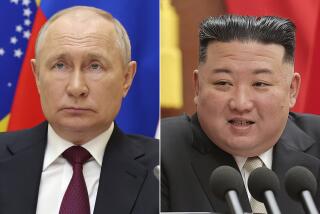Secret Memos Detail U.S. Effort to Aid Iraq : Policy: One note decries rules slowing technology sales. Another reveals an unchecked Hussein spent up to $20 billion on chemical, nuclear arms.
WASHINGTON — A State Department memo released Thursday provides more details about Bush Administration efforts to relax restrictions on sales of sensitive technology to Iraq and to increase trade in the months before the invasion of Kuwait.
Another department memo released Thursday described the results of that policy, explaining that Iraq was able to spend $10 billion to $20 billion to develop nuclear and chemical weapons and “no one was paying attention to the need” to block them.
The documents provided further insight into details about the decisions and technology transfers that strengthened Iraq and now have become controversial. The documents, previously labeled “secret,” were released by Rep. Sam Gejdenson (D-Conn.) after the Administration agreed to declassify them.
“No one in the Administration was paying attention to help being given to (Iraqi President) Saddam Hussein, the man George Bush later compared to Adolph Hitler, as he built his nuclear and chemical weapons arsenal,” said Gejdenson, whose House Foreign Affairs international trade subcommittee has been scrutinizing exports to Iraq for over a year.
The memo seeking to increase technology sales to Iraq was written in late February or early March of 1990 by John Kelly, an assistant secretary of state. At the time, the State Department was pushing to release a final $500 million in economic aid for Iraq and to improve other ties with Baghdad, despite rising concerns in some quarters of the Administration about Hussein’s belligerence.
Sales to Iraq, however, were being slowed by an interagency committee regulating exports of nuclear technology, according to Kelly’s internal memo.
Kelly complained that “our licensing procedures have been a drag on trade with Iraq” and recommended that the State Department play a more active role in pressing for approval of licenses to Iraq.
“We have explicit presidential authority for expanding trade with Iraq and a 1987 commercial agreement in which we pledged . . . to remove obstacles to trade involving technology transfer,” Kelly wrote.
The presidential authority was a reference to National Security Directive 26, an order signed by President Bush on Oct. 2, 1989, that mandated increased political and economic ties with Iraq.
The reference to the 1987 agreement was unexplained. In the spring of 1987, however, then-Vice President Bush met with Iraqi Ambassador Nizar Hamdoon and promised a loosening of restrictions on the sale of technology with commercial and military uses to Iraq.
The second memo released Thursday was written to Secretary of State James A. Baker III by Richard A. Clarke, assistant secretary of state for political and military affairs. There was no date on the document, but it appeared to have been written after Iraq’s invasion of Kuwait on Aug. 2, 1990, and before the start of the allied air war on Jan. 17, 1991.
Titled “Counting of Iraqi Weapons of Mass Destruction,” the document explored options for ridding Iraq of its nuclear capacity and described the vital role played by Western countries and technology in the buildup of its arsenal of nuclear and chemical weapons, called NCW in the memo.
“Iraq took most of a decade and $10-$20 billion (roughly estimated) to build its NCW capabilities to current levels and relied on massive international aid (technical, financial and military) to help Iraq survive its war with Iran,” wrote Clarke. “No one was paying attention to the need to block NCW proliferation.”
The memo cast the international aid in the context of the Iran-Iraq War, although substantial amounts of American assistance went to Iraq after the war ended in August, 1988. The most sweeping U.S. policy favoring Iraq, NSD 26, was signed by the President 14 months after the end of that war.
Gejdenson’s subcommittee has collected dozens of classified documents detailing the U.S.-Iraq relationship, but the Connecticut Democrat has declined to release the records unless the Administration declassifies them.
Frantz is a Times staff writer and Waas is a special correspondent.
More to Read
Sign up for Essential California
The most important California stories and recommendations in your inbox every morning.
You may occasionally receive promotional content from the Los Angeles Times.










